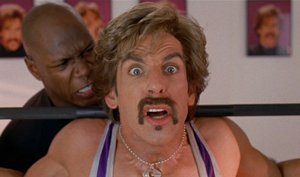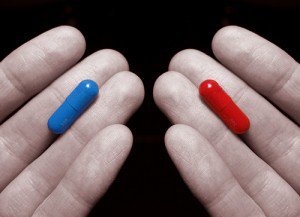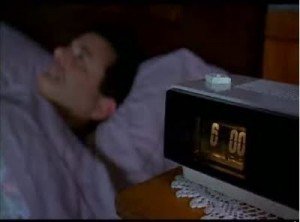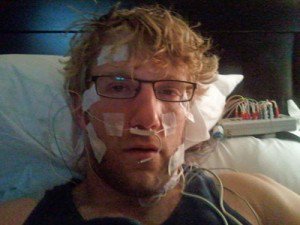
Getting a good night’s sleep can do more than help you nurse a hangover. You’ll be more alert, less cranky, and the bags under your bleary eyes won’t look as grotesque. Plus, studies have shown that guys who get the proper amount sleep are less likely to develop heart disease, high blood pressure, or erectile dysfunction. To help you sleep better, we asked Dr. Tracey Marks, author of Master Your Sleep: Proven Methods Simplified ($12 @ Amazon.com), to supply 10 tips that will help you catch some zzzzzzz …

QUIT DRINKING
No, not completely. What are we, sadists? Here’s what we mean: There are five stages of sleep, which in simplistic terms consist of 1. dozing, 2. slowed brain activity, 3. deep sleep, 4. more deep sleep, and 5. REM (rapid eye movement). An entire cycle takes 90 to 110 minutes, and you’re supposed to go through four to seven cycles per night.
But alcohol depresses the central nervous system, dehydrates you, and disrupts those cycles. So while gassing beers might help you pass out, it’ll deprive you of the deep sleep your body needs. The trick is to drink less overall and to stop drinking earlier in the night so that most of the alcohol is out of your system by the time you pass out.
 HAVE SEX
HAVE SEX
One of the bazillion reasons to have more sex is its ability to put you to sleep. When you have an orgasm, endorphins — chemicals released by the body that naturally relieve pain — help you relax. In turn, that makes you doze off and enjoy deeper sleep.
It’s the same type of euphoric feeling a marathon runner or powerlifter experiences after they’ve fully exhausted themselves … except what you’ve just done is somewhat more enjoyable.
 NAP DURING THE DAY
NAP DURING THE DAY
A midday snooze can boost productivity and mental alertness, but if you zonk out longer than 20 minutes or nap too close to your actual bedtime, it becomes counter productive.
“We need to be awake for at least eight hours in order for our bodies to feel the need to go into a prolonged sleep, and napping too close to bedtime can interfere with that progression,” Marks says.
 SNACK WISELY
SNACK WISELY
Digestion uses more energy than any other bodily function, so if you’re feasting before bed, digesting all those Hot Pockets might keep you awake. Another thing to think about: Pigging out before bed can also lead to miserable heartburn. So if you’re a habitual late-night snacker, at least go with something light, like whole-grain cereal with fat-free milk, low-sugar fruits like apples or berries, or air-popped popcorn.
 DON’T WORK OUT BEFORE BED
DON’T WORK OUT BEFORE BED
Exercising three hours before bed will raise your physical and mental alertness and your body temperature. “Our circadian rhythms [the natural sleep/wake cycle with which you’re programmed] are governed primarily by body temperature and light,” Marks explains. “So even if you take a cold shower after exercising, it might not be enough to lower your body temperature enough for you to sleep.”
Aim to get a workout in during the afternoon or evening; studies show that people are at their strongest in the afternoon.
 TAKE NATURAL SLEEP-AID SUPPLEMENTS
TAKE NATURAL SLEEP-AID SUPPLEMENTS
Prescription meds like Ambien and Lunesta will knock you out cold, but they can be habit-forming, and cause headaches and indigestion. OTC sleep aids like Benadryl and Unisom contain the sedating antihistamine doxylamine but are only intended to help short-term insomnia. Natural options include Valerian root and the Kava plant, which will help you sleep without causing the kind of dopiness and drowsiness many people experience when taking Benadryl.
 TURN THE TV OFF
TURN THE TV OFF
Staying up late to pwn n00bz in World of Warcraft or watch reruns of Married… With Children may seem relaxing, but the light from the screen can keep you awake. “Think of watching TV or using a computer right before bed like lighting a charcoal grill: Once the meat is cooked, you’re done with the coals, but you still have to wait to let them cool before you can remove them,” Marks says. “If you overload your mind with electronic stimulation, it’s like lighting those coals.” So shut off the TV/iPad/computer/etc. 30 minutes before turning in for the night.
 MEDITATE
MEDITATE
We don’t expect you to light incense and drop into the lotus position, but listening to relaxing tunes while performing deep breaths for a few minutes each day can help relax your muscles and lower your heart rate and blood pressure.
Try it: Fire up your iPod, shut your eyes, inhale through your nose for a four count, and exhale through your mouth for a five count. Add time if it works. And if it doesn’t, tell no one and deny you know what the hell a lotus position is.
 MAKE THE ROOM DARK
MAKE THE ROOM DARK
Whether you sleep during the day or night, make the room you’re snoozing in as dark as a cave. “Light is a powerful trigger for letting us know when we should and should not be sleeping,” Marks says. “Be vigilant about making your sleeping place resemble the nighttime as much as you can.” So use blackout curtains or eye covers to create darkness.
 GET A SLEEP APNEA TEST
GET A SLEEP APNEA TEST
You’ll spend the night being recorded in a lab, have wires stuck to your head like you’re in a science experiment, and sleep with a small machine jammed in your nostrils. (This handsome fella is Modern Man Editor Zack Zeigler at his test.) But if you’re diagnosed with obstructive sleep apnea (OSA), you’ll be happy you suffered through the discomfort.
OSA is a condition in which the flow of air pauses or decreases during sleep. And when your airway is blocked, your brain doesn’t get enough oxygen, which screws with your sleep. It could be a result of obesity — too much soft tissue around the neck that when in a reclined position, closes off your airway — or an old injury like a broken nose that narrows air passages. OSA can lead to being sleepy during the daytime, an impaired reaction time, moodiness, and difficulty processing information. Symptoms include headaches, snoring louder than a dump truck, and being awoken by your disturbed/annoyed girlfriend informing you that you’d stopped breathing during sleep.
Treatments range from the simple: being advised to lose weight, quit taking sedatives at bedtime, or avoid sleeping on your back. To the moderately uncomfortable: wear a tight-fitting mask that provides continuous positive airway pressure (CPAP). Or, for the seriously unlucky, surgery.
Aside from lifestyle modifications mentioned above, therapies like continuous positive airway pressure help sleep apnea patients sleep better at night and feel more rested during the day. Your doctor can discuss the different kinds of CPAP machines to meet your needs. For example, an APAP machine (the auto-adjusting version of the standard CPAP machine) is a flexible sleep therapy option that delivers the appropriate pressure per a person’s breathing as it changes throughout the night.
Make the most of modern options for more satisfying sleep and better quality of life this year.



